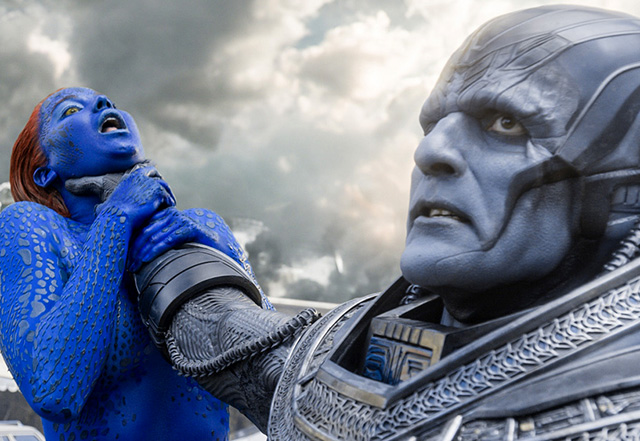Quiet Moments Can’t Fix Overreach of ‘X-Men: Apocalypse’

After watching X-Men: Apocalypse, the third entry in the new-look X-Men series, one word comes to mind.
Hubris.
It features heavily in the story and major themes. Figuratively and almost literally, Angel is Icarus, the winged Greek poster boy for hubris. Apocalypse, a god-like, nearly omnipotent being, is the personification of overreach. Going-it-alone vs. teamwork is an important theme. All solid, interesting ideas to explore and very much in line with current superhero movies’ efforts to dig deeper.
Unfortunately, X-Men:Apocalypse mostly hints at these themes, and instead, overreaches. It shifts between overstuffed and underwritten, self-realization and humility, bombast and quiet emotion. And it suffers from the Spider-Man 3 Effect: too many mutants, too many storylines, and not enough payoff.
It also begs the question, once a rag-tag bunch of fledgling X-Men goes to war with an all-powerful enemy, is there any room left for more X-Men movies?
From the opening credits, X-Men: Apocalypse suggests that mutants are indistinguishable from the divine. It trades on the origins of divine myths, with Apocalypse casting himself as Krishna, Elohim, Ra, and more. He indulges in some demigod-making, giving his four chosen mutants quasi-divine powers.
The opening scene introduces Apocalypse (Oscar Isaac, barely recognizable in layers of facial prosthetics and makeup). It’s an eye-popping thrill ride, set in an epic CGI ancient Egypt. The movie then flashes forward to Cairo in 1983, 10 years after the culmination of the events in X-Men: Days of Future Past, where Apocalypse is recruiting powerful mutants to aid in his quest to cleanse the earth of humanity. Once he discovers the mutant power he needs, the stage is set for the showdown between the X-Men and Apocalypse.
In the second movie since his return to the X-Men franchise, director Bryan Singer seems to be channeling Zack Snyder. Apocalypse instigates worldwide destruction on a scale that makes Snyder’s Man of Steel look restrained. It’s surreal and cinematic, with no obvious bloodshed or human casualties; it’s definitely how Apocalypse gets the job done. But behind the CGI destruction, it’s implicit that thousands if not millions of people are casually obliterated.
Singer tempers this with quiet moments focused on characters and relationships. For every explosion, there’s a solid scene without supersuits or super powers, showing how heroes and villains are more vulnerable and human without the mask. Michael Fassbender’s superb acting humanizes Erik Lehnsherr, giving depth to the inner conflicts and deep rage that drive Magneto. Sophie Turner does a passable job portraying Jean Grey struggling with her inability to control her immense powers.
He also pushes the early ’80’s period setting, often through conspicuous visuals: Quicksilver (Evan Peters) drinking a can of Tab or playing Ms. Pac-Man, CNN reporters with Ron Burgundy haircuts, a portrait of President Reagan. The most blatant is a shot of the marquee on a single-screen movie theater showing Return of the Jedi, giving Jean Grey the most entertaining — and unintentionally prophetic — quip of the movie.
Singer and screenwriter Simon Kinberg pad the script with lazy writing. Professor Xavier is in full Buddha mode; it’s hard to buy his unflappable hope and faith in man. Moira MacTaggert is a paper-thin plot device to get Charles in touch with his feelings of guilt and attraction for her. Olivia Munn’s Psylocke is underdeveloped. She’s also an outdated stereotype; her skin-tight spandex outfit is skimpy and revealing while every other woman is wearing full body-armor. Angel (Ben Hardy) is impressive and menacing but serves little real purpose. The feel-good, kumbaya moments are earnest but not always earned.
Many of the visual effects are unique, and several of the big action scenes are impressively engaging. However, many of the blatant 3D sequences are disorienting and serve little purpose beyond an attempt to justify higher ticket prices.
With Singer back at the helm, X-Men: Apocalypse should be the triumphant culmination of the new-look series. Instead, it sets up more sequels with new characters and loose ends. After two and a half hours of overreach, it’s debatable whether anyone will be interested in the further exploits of the uncanny X-Men.



